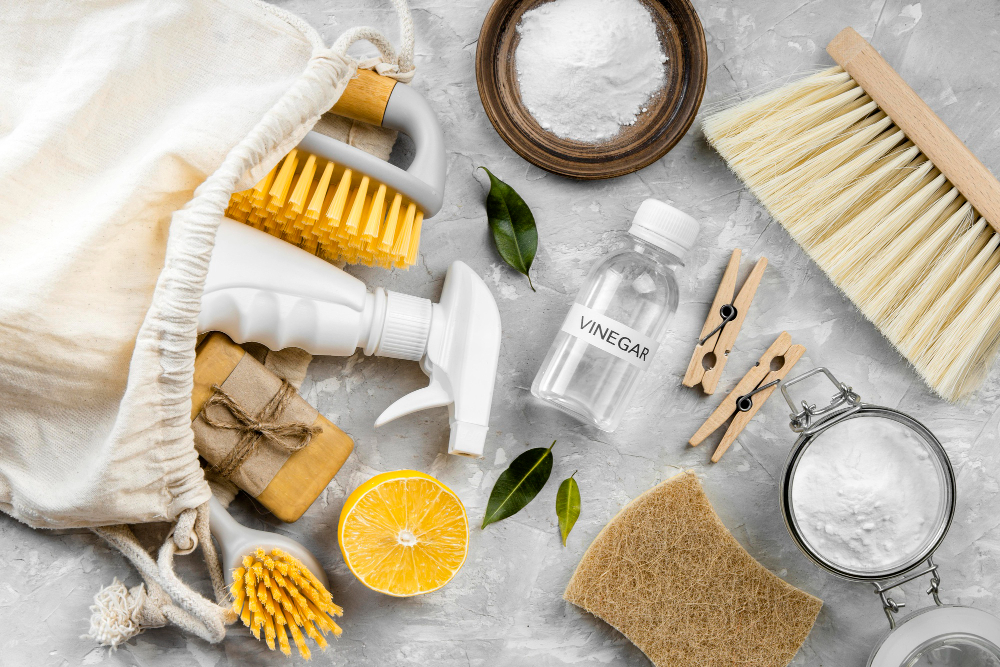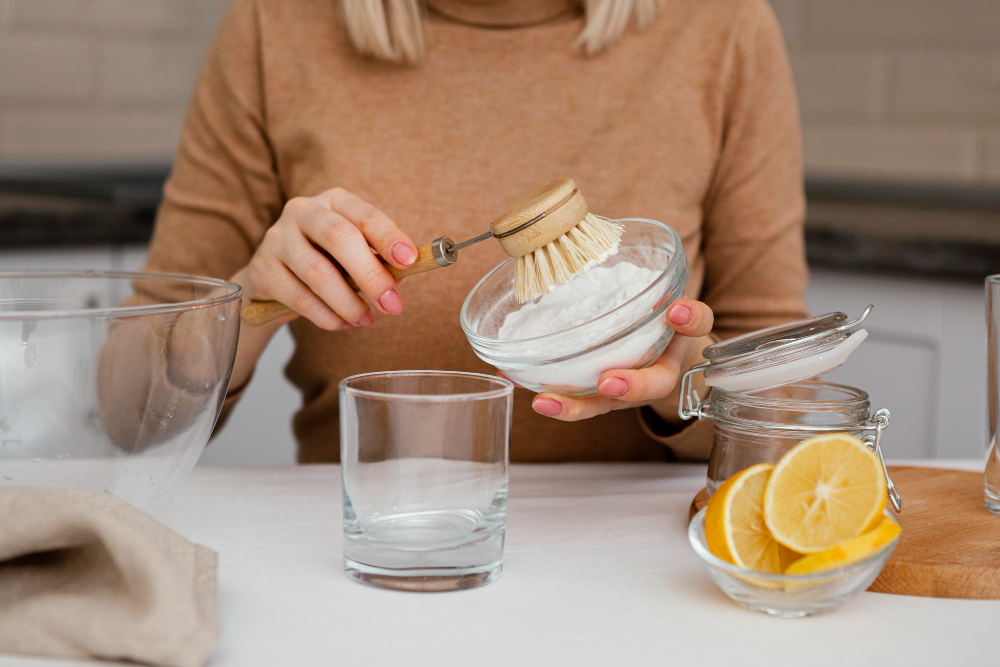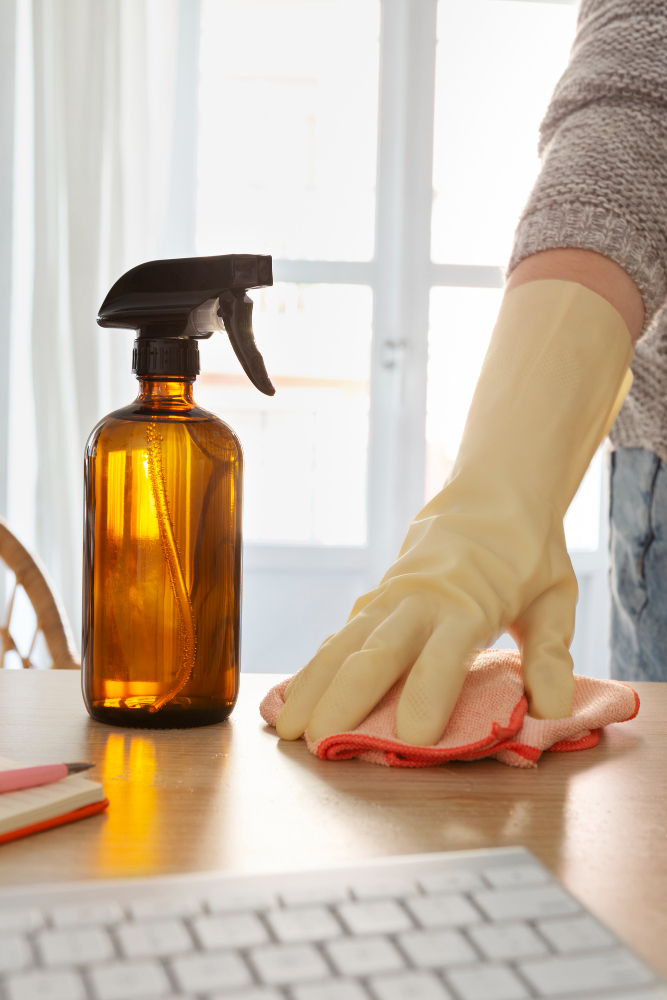A few years ago, I had a moment.
I was scrubbing my kitchen counter with a store-bought spray that made my eyes water and my skin itch—and I suddenly thought: Why am I doing this to myself?
I flipped the bottle over. A wall of unpronounceable ingredients stared back. It felt like I was fumigating my house every time I cleaned.
That was the day I decided to ditch the chemicals.
What started as curiosity turned into a full-blown obsession with DIY natural cleaning products. Not only are they safer and cheaper, but they actually work, often better than the store-bought stuff.
And the best part? They smell amazing and take just minutes to make.
If you’re looking to detox your home without sacrificing cleanliness, here are the exact recipes and tips I use every week.
Why Go Natural? (Besides the Obvious)
It’s not just about avoiding harsh chemicals (though that’s a huge part of it).
Natural cleaning products are:
- Budget-friendly: Most recipes cost pennies per batch.
- Eco-conscious: No plastic waste from endless bottles.
- Customizable: You control the scent, strength, and ingredients.
Plus, once you learn the basics, you can whip up anything—from glass cleaner to floor polish—using just a few core ingredients.
Let’s dive in.
The Secret Weapons of Natural Cleaning
There are a few pantry staples you’ll see again and again. Stock up on these, and you can make almost any cleaning product:
- White vinegar – Disinfects, deodorizes, and cuts grease
- Baking soda – Deodorizes, scrubs, and softens water
- Washing soda – A more powerful cousin of baking soda, perfect for laundry and tough grime
- Castile soap – A gentle, plant-based soap that works wonders
- Isopropyl alcohol – Great for disinfecting and quick drying
- Essential oils – More on those in a second
The Magic of Essential Oils (And Which Ones to Use)
This was a game-changer for me.
Essential oils not only boost cleaning power but also make your home smell like a spa. Here are my go-tos:
- Lemon – A natural degreaser that tackles grime and leaves a zesty freshness
- Tea tree – A disinfecting powerhouse; perfect for bathrooms and high-touch areas
- Lavender – Mild, soothing, and excellent for freshening up linens
- Peppermint – Sharp, clean scent that also repels bugs
- Eucalyptus – Great for stuffy spaces; cuts through odors like a charm
Pro tip: Use only high-quality, 100% pure essential oils. Cheap blends can contain synthetic fillers that defeat the purpose.
Homemade Disinfectant Wipes (That Actually Work)
These are a lifesaver for wiping down handles, switches, and counters—without the chemical fog.
You’ll need:
- 1 cup 70% isopropyl alcohol
- ¼ cup distilled water
- 1 tablespoon castile soap or dish soap
- 50 drops of tea tree oil
- Reusable cloths or half a roll of paper towels
- An airtight glass jar or container
Instructions:
- Mix alcohol, water, soap, and essential oil in a bowl.
- Place the cloths or paper towels in the jar.
- Pour the mixture over the clothes and seal the container.
They’re ready to use after just 10 minutes. Wash and reuse the clothes as needed. These wipes stay effective for weeks, but avoid storing them in sunlight.
Want a bleach-based version? Use 4 teaspoons of bleach per quart of water, but never mix bleach with anything else. Use within 24 hours, and always wear gloves.

My DIY All-Purpose Cleaner
This is the one I use every single day—for kitchen messes, bathroom counters, and even my yoga mat.
You’ll need:
- 1 cup white vinegar
- 1 cup water
- 10 drops of lemon oil
- 10 drops of tea tree oil
Mix in a spray bottle, shake well, and get spritzing.
Don’t love the vinegar smell? It fades in minutes. Or, let citrus peels infuse in vinegar for a week beforehand—it’s magic.
Non-Toxic Laundry Detergent (That Smells Divine)
Switching my laundry routine was one of the best moves I ever made.
Here’s my go-to powdered detergent recipe:
You’ll need:
- 1 cup washing soda
- 1 cup baking soda
- 1 cup borax (optional, skip if sensitive)
- 1 grated bar of castile soap
- 10 drops of lavender or lemon oil
How to use:
- Add 1–2 tablespoons per load
- Store in an airtight jar
It’s gentle on skin, tough on stains, and safe for HE machines.
Want a liquid version?
Grate one laundry soap bar and melt it in 4 cups of hot water. Then mix in:
- ½ cup washing soda
- ½ cup borax
- Add this to a large container and fill with water to make 5 gallons.
Stir before each use. Use ¼–½ cup per load.
Bonus: Natural Glass + Mirror Cleaner
Say goodbye to streaks.
You’ll need:
- 2 cups water
- ½ cup white vinegar
- 1 tablespoon cornstarch (yep—it helps eliminate streaks)
- 10 drops of lemon or eucalyptus oil
Shake before each use and spray lightly. Wipe with a microfiber cloth.
Real Talk: Is DIY Cleaning Worth the Effort
Let me be honest—when I started, I was skeptical.
Would these homemade mixes really clean my home? Would I spend hours making them?
Turns out, they’re easier than baking cookies. I make all my staples in under 30 minutes a month. Most recipes take less than 5 minutes.
And the results? My house is sparkling, it smells better than ever, and I never have to worry about what my toddler is touching or inhaling.
A Few Extra Tips
- Label everything: It sounds obvious, but it’s easy to forget which jar is which.
- Store in glass: Especially if you’re using essential oils—plastic can degrade over time.
- Spot test: Always test new mixtures on a small area first.
- Involve your kids: They’ll love helping you “mix potions”—and it teaches them about safe, sustainable habits.
Final Thoughts: Your Home, Your Rules
There’s something deeply satisfying about reclaiming control over your home environment.
When you make your own cleaning products, you’re not just saving money—you’re creating a healthier space, reducing your impact, and breaking free from the cycle of endless plastic and mystery ingredients.
Start with one recipe. See how it feels. I promise—it won’t be your last.
Because once you experience the power of clean that smells like a lemon grove and feels like peace of mind… there’s no going back.






[…] grass is rarely a native plant. If you take a stroll in the untouched natural spaces near your home, you are unlikely to find lush, naturally growing lawns in the woods or even in the fields. This is […]